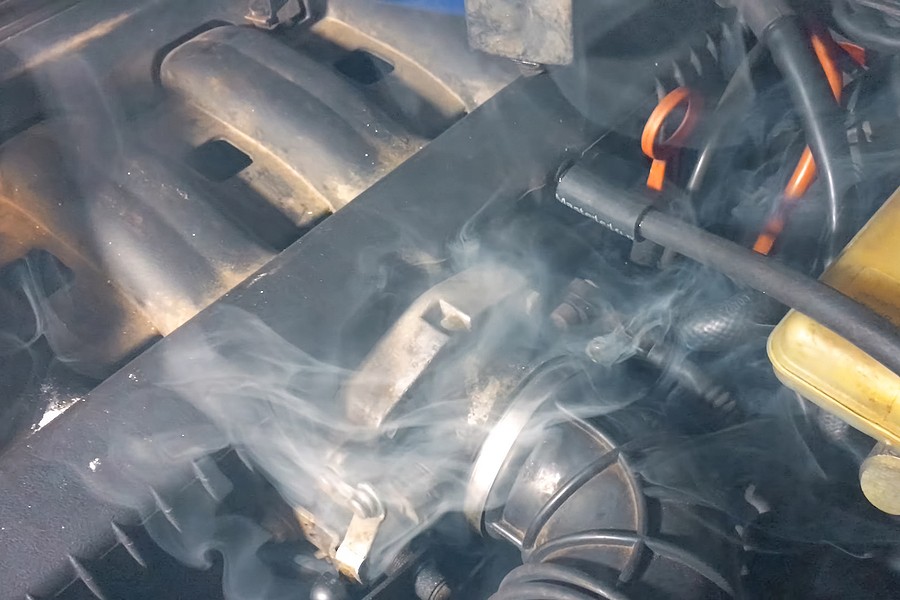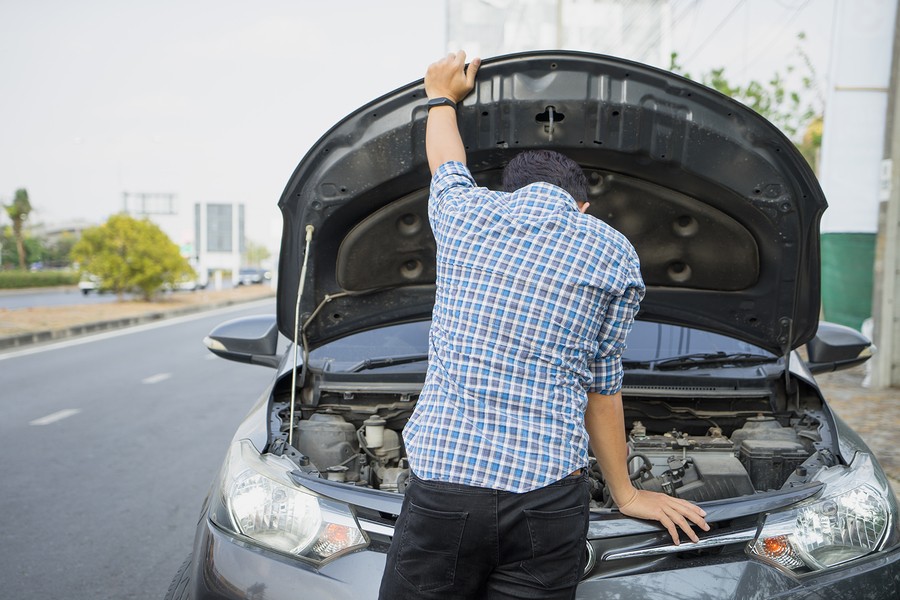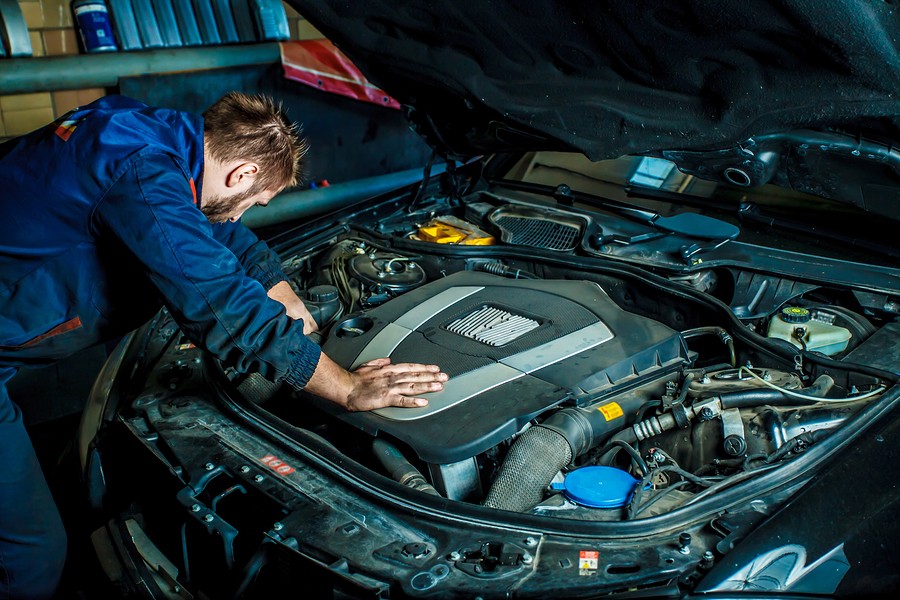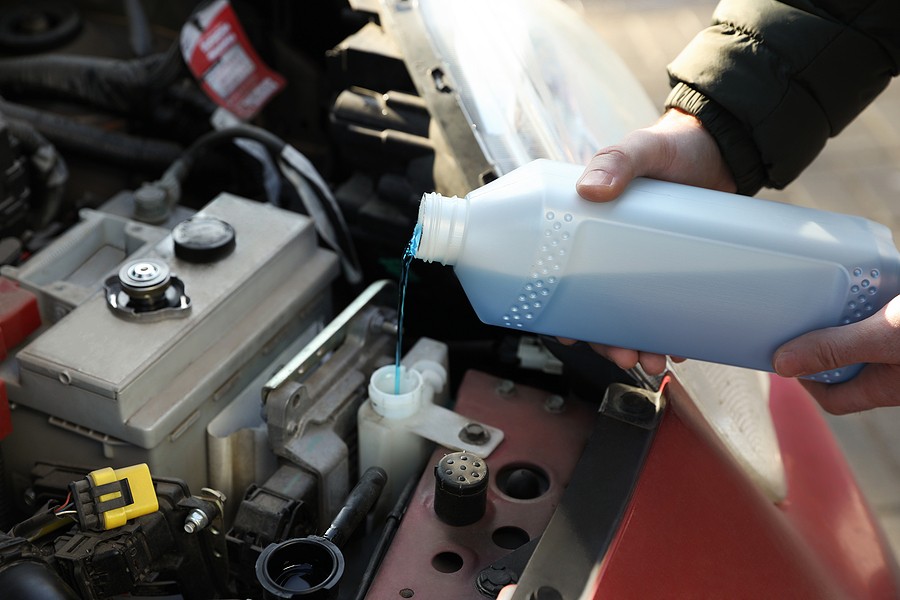These are the ten most common symptoms indicating a cracked engine block:
- Reduced engine performance
- Clear engine smoke
- Increase engine temperature
- Oil mixed with antifreeze
- Leaking fluids
- Frozen radiator coolant
- Extreme smoke from the exhaust
- Reduced coolant level
- Increased fuel consumption
- Vehicle failure
Your vehicle’s engine is a critical component that you must always keep up with. If you plan to purchase a used vehicle, you must ensure the engine is in good shape. Otherwise, you can deal with significant problems that could cost you money.
One of the first things you must be careful about is the engine block. It's a common problem to deal with a cracked engine block, which means a completely failed vehicle that might not be obvious to the average driver.
Understanding the main symptoms of a cracked engine block can help prevent purchasing a car with many problems. So, the first step is to familiarize yourself with the common symptoms of a cracked engine block.
In this article, we will provide you with the ten most common symptoms to help you answer the question, “How do you know if your car's engine block is cracked?” If you confirm these symptoms, you must not purchase this vehicle because it's not worth it. If you own a vehicle that deals with this problem, you have to think twice before spending the money fixing it.
How do you know if your car's engine block is cracked? The main symptoms
When your vehicle's engine block cracks, the problem is severe and requires immediate attention from your mechanic. People often give up on their cars and purchase another instead of spending thousands of dollars trying to fix the car.
However, in some instances, you can detect the problem early, allowing you some chances to fix the vehicle without needing to install major components. Therefore, an important step for every driver is to understand the main symptoms indicating a cracked engine block.
This is important for current vehicle owners and even more important for those looking to purchase used vehicles and concerned about some engine problems.
The following list summarizes the ten most common symptoms that could indicate an issue with your engine block. These symptoms might be related to other problems, so you have to confirm with your mechanic whether this problem is linked to the engine block or something else. Regardless of the source of the problem, it is a serious situation that you have to address whenever you deal with any of the following symptoms:
1- Reduced engine performance
The first and most common thing you'll deal with whenever your engine has an issue with the block is reduced engine performance. Your engine is designed to withstand a certain pressure, and if a vacuum or a leak impacts the pressure level, the vehicle will not operate as it should.
You might notice that the car hesitates to accelerate or performs slightly differently than you purchased it before. If you're planning to purchase a used vehicle, you'll notice that the car needs to respond as it should, and no matter how much fuel you provide, it still needs to be operating properly.
2- Clear engine smoke
Another severe issue that might indicate a cracked engine block is when you see smoke coming out of the engine compartment. This is a very serious situation, especially if you have yet to gain previous experience and need help figuring out what to do.
That's why whenever you notice any issues related to smoke coming from the engine compartment, you must park your car whenever possible. If you're driving on a highway, try finding the nearest exits or pulling to the shoulder if the problem is severe.

3- Increase engine temperature
You should monitor for when you suspect an issue related to the engine compartment by looking at the engine temperature. Usually, there is a temperature gauge on the dashboard that communicates with you and continuously monitors the current engine temperature.
If you notice that this gauge is weirdly reading very high or fluctuating, it might indicate that your engine is overheating. Overheating is very general and can be linked to a lot of issues. Still, those issues are all important to address as soon as possible because this overheating can easily lead to severe damage.
4- Oil mixed with antifreeze
When your vehicle has a significant problem in the engine compartment and the block, you can easily see some situations where the oil gets mixed with coolant. Those two fluids flow in different pathways and are not supposed to mix. When this happens, it indicates you're dealing with a big problem you must address immediately.
You can check on the oil reservoir and even look at the oil cap to see if there's any Milky substance or something that does not look how your oil should look. In that case, you're most likely dealing with an issue related to the engine block, but it could also be that your head gasket is blown.

5- Leaking fluids
When the engine block is cracked, dealing with situations where the vehicle leaks fluids is not surprising. Typically, your vehicle should contain a specific amount of fluid that you must maintain, not only the quantity but also the quality.
Depending on the importance of these fluids, if they start leaking significantly, it might indicate the vehicle's performance. It might start with a simple problem, but it can escalate easily to the point where your vehicle fails.
That's why, regardless of the source of this fluid leak, you must address the problem sooner rather than later. If this is related to a cracked engine block, the vehicle is probably not worth the repairs or even the purchase if you're shopping for a used vehicle.
6- Frozen radiator coolant
Some customers indicated that the coolant gets frozen inside the radiator when the engine block is cracked. This is something you need to watch for and look closely for, and it can be a challenge for those who have yet to gain previous experience.
That's why we always recommend investing and bringing in an ethnic whenever you're planning to purchase a used car because even if it costs you some money initially, it will save you a lot of issues down the road.

7- Extreme smoke from the exhaust
If you're planning to purchase a used car that's been designed recently and is from a modern vehicle, you usually shouldn't see visible smoke coming from the exhaust. Most of these vehicles are designed to treat most of these gases so they don't harm the environment.
However, in some difficult situations, like when your engine block is cracked, you might notice that the gas is starting to show up, and those might have different colors indicating different problems. For example, if the color is white, the problem is likely related to coolant leaking inside the engine. So, we encourage you to check for any smoke from the exhaust that does not look how vehicles should operate.
8- Reduced coolant level
If the cracked engine block resulted in a coolant leak, dealing with low coolant levels is unsurprising, especially if the problem evolved. In other words, if you have a minor issue in the cracked engine block, you might not necessarily see a significant reduction in the cool Lance. Still, if the problem occurs and you ignore it for some time, you can deal with many consequences, including the significantly reduced coolant.
If your vehicle complains about a local level, please resolve the problem immediately before things get out of hand. In most scenarios, your vehicle's engine can get self-destructed in no time if you ignore this problem.

9- Increased fuel consumption
Many customers indicated that when they had issues with the engine in general, regardless of whether it was related to the cracked engine block, they noticed that the vehicle works so hard that it consumes too much fuel.
That can be easy to detect, especially if you have owned the vehicle for a long time. In other words, if you notice that you need to go to the gas station more often than before, you have to check on the engine performance and see if it's overstressed. Sometimes, the problem might be related to the cracked engine block, but you must confirm with your mechanic because it could be linked to other stuff.
10- Vehicle failure
Finally, you don't have previous experience and ignored the previously mentioned symptoms. In that case, getting to the point where your vehicle fails because of a cracked engine block is unsurprising. Unfortunately, it might be hard to resolve the issue without replacing the entire engine.

Final Thoughts
A cracked engine block is never fun because the vehicle has severe issues requiring thousands of dollars in repair. Therefore, the last thing you want to do is purchase a used car with this problem or even spend the money fixing your vehicle if it does have this problem.
The best way to determine whether your vehicle has a cracked engine block is to watch for the common symptoms highlighted in this article. These include issues with your vehicle's engine performance, engine smoke, frozen radiator coolant, etc.
If you verified that your car has an issue related to a cracked engine block, you would need to look over the situation carefully. Before you spend the money, please think of selling this vehicle instead of wasting your time and money trying to make it work.
If you've ever been looking for someone to buy your car without any concerns about the issue with the engine block, you can always consult Cash Cars Buyer at 773-791-4363.
If you're interested in similar posts, we highly encourage you to visit our blog by clicking here.



